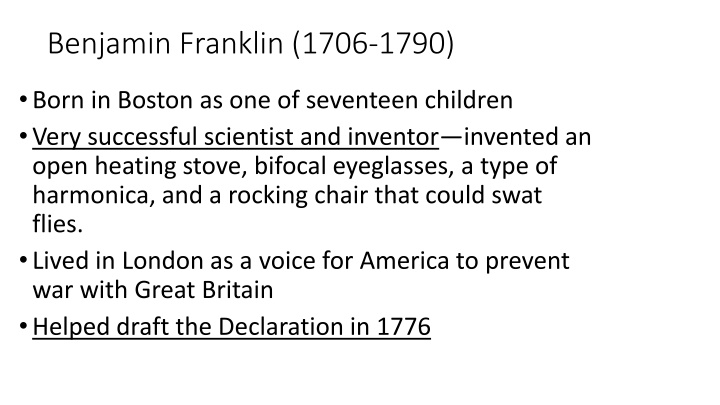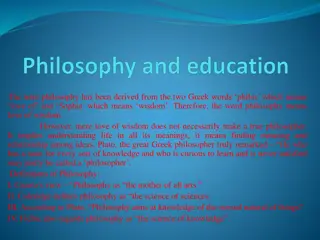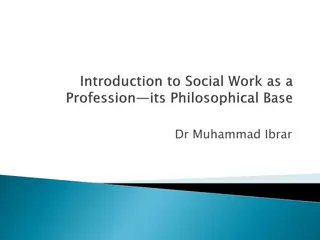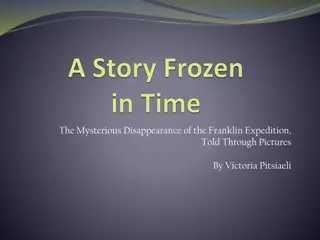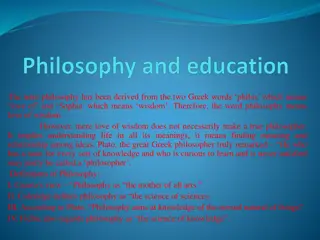Insights into Benjamin Franklin's Character and Philosophy
Benjamin Franklin, a renowned scientist, inventor, and diplomat, showcased honesty, self-reliance, discipline, and practicality in his quest for moral perfection. Through his virtues and beliefs rooted in Puritanism, he emphasized self-improvement for a better society. Franklin's actions and values reflect his character and philosophical assumptions, offering a glimpse into his ideals and potential modern causes he might support.
Download Presentation

Please find below an Image/Link to download the presentation.
The content on the website is provided AS IS for your information and personal use only. It may not be sold, licensed, or shared on other websites without obtaining consent from the author.If you encounter any issues during the download, it is possible that the publisher has removed the file from their server.
You are allowed to download the files provided on this website for personal or commercial use, subject to the condition that they are used lawfully. All files are the property of their respective owners.
The content on the website is provided AS IS for your information and personal use only. It may not be sold, licensed, or shared on other websites without obtaining consent from the author.
E N D
Presentation Transcript
Benjamin Franklin (1706-1790) Born in Boston as one of seventeen children Very successful scientist and inventor invented an open heating stove, bifocal eyeglasses, a type of harmonica, and a rocking chair that could swat flies. Lived in London as a voice for America to prevent war with Great Britain Helped draft the Declaration in 1776
Autobiography Began writing when he was 65, never finished it and it was not published during his lifetime. Franklin s view of America is that it is a land of opportunity He stresses the idea that moral perfection is a gift from God. Franklin s 13 virtues are deeply rooted in Puritanism. He offers them as a practical formula for improving himself and his society.
Franklin Questions 1. Franklin has almost no money and is very hungry. Why then does he insist on paying for his passage on the boat? What does this reveal about his character? 2. What does Franklin say must happen before people can depend on correct moral behavior? 3. What inferences can you make about Franklin s attitudes and beliefs, based on his plan to achieve moral perfection? If Franklin were alive today, what modern causes might he support? 4. What does Franklin s plan of achieving moral perfection reveal about his character? 5. Franklin writes about arriving at moral perfection just as he had earlier written about his arrival in the city of Philadelphia. What does this similarity in his language reveal about Franklin s philosophical assumptions?
ANSWERS to Franklin Questions 1. He wants to pay his way and not be indebted to others. It shows he s honest, upright, and perhaps proud. 2. They must first break bad habits and acquire good ones. 3. Possible answers: Franklin believes in the virtues of practicality, discipline, and self-reliance. If he were alive today, he might support antidrug and stay-in-school programs. 4. It reveals that he is diligent, orderly, organized, and logical. It shows that he attempts to control emotional behavior with reason. 5. Possible answer: He assumes that one can plot a course to achieve moral perfection.
